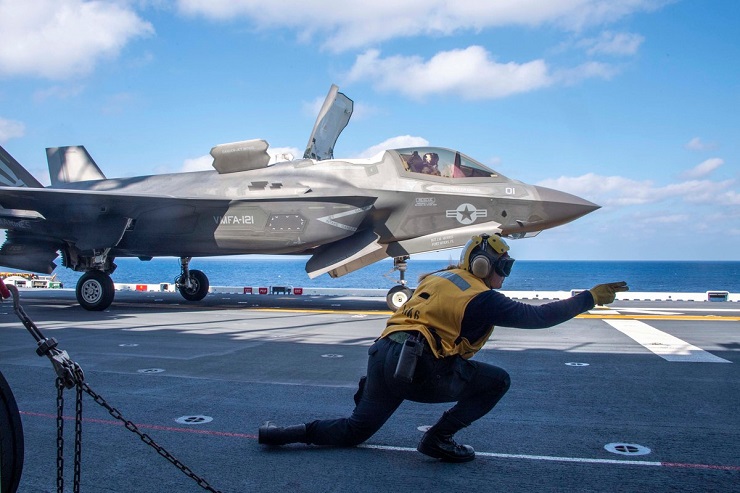A major blow has been inflicted to the US standing and influence in the Middle East by the UAE that is scraping the F-35 deal with Washington. This decision comes on the back of some stubborn US efforts to dissuade the UAE from acquiring the Chinese 5G expertise. The US has been doing everything it could to force Abu Dhabi into sacrificing its relations with China for the longest time, but the UAE decided to to turn its back on Washington, leaving it in a quandary. The first major stike to the US tactics of using its military industrial complex to achieve its foreign policy objectives came almost a month ago when Abu Dhabi first made a deal with France to purchase 80 state of the art Rafael fighter jets. According to former UK ambassador to the Syria, Peter Ford, the UAE has valid reasons to pull itself out of the deal because of the “arrogant” US demands.
Although the US officials continue to emphasise that the US ties with the UAE are rock-solid, reports even in the western media have shown how tensions surrounding the UAE’s refusal to jump on the anti-China bandwagon being led by the US have directly contributed to the present crisis. For the US, Chinese presence in the Middle East is a major problem.
According to the 2020 Pentagon report on China’s expanding military presence in the Middle East, the UAE happens to be among the countries Beijing is “very likely already considering and planning for additional overseas military logistics facilities to support naval, air, and ground forces.” The report also said the expansion of China’s 5G technology to countries, including the UAE, will also help set Beijing itself as a global leader in at least 10 different industries, some of which directly relate to defense. For the US, therefore, preventing Beijing’s rise is imperative – a task Washington hopes to achieve by persuading, or forcing and coercing, its friends, including the UAE.
This imperative received another hyper-boost when the US intelligence agencies reported in November-2021 that China was secretly building a military facility at a port in the UAE, leading the Biden administration to “send a warning” to the Emirati officials that Chinese military presence in the UAE could permanently damage the US-UAE ties.
The UAE has obviously not bowed down, showing the very limits of the pressure the US can actually exert through such pressure tactics. For the UAE, China is far more important an ally than Washington, at least in the economic and technology spheres.
The China-UAE bilateral trade has overcome the negative impacts of the global pandemic for almost two consecutive years, a top Chinese diplomat told Emirates News Agency (WAM). The bilateral trade during the first nine months of 2021 has exceeded the value of US$49 billion, a 38.1 percent increase compared to the same period in the previous year, revealed Ni Jian, Chinese Ambassador to the UAE. This trade is on top of the fact that more than 6,000 Chinese firms have developed business in the UAE, involving energy, ports, infrastructure, communications, finance, and other sectors, the ambassador said. As compared to the UAE-China trade, the US-UAE trade stood merely at US$17.8 billion in 2020.
For the US, therefore, the UAE is already very much a ‘Chinese territory’; therefore, giving the UAE the F-35s without enough strings attached to them could possibly allow China to ‘steal’ the US technology. The significance of ‘protecting’ US technology has increased manifold in the wake of growing US interest in building a global coalition against China to restrict its ability to develop into a super power capable of establishing a new, multilateral world order. But the UAE has shown no interest in countering China. The message it sent to US made it clear in unambiguous terms.
According to reports in the western media, Abu Dhabi told the US officials that they intended to halt the deal because “Abu Dhabi thought security requirements the US had laid out to safeguard the high-tech weaponry from Chinese espionage were too onerous.” These strings are putting the country’s national sovereignty in jeopardy in ways not acceptable to UAE, the officials further stressed.
The UAE’s decision to scrap the F-35 deal and embrace Huawei’s 5G technology means that the impact of this decision could trickle down to other countries currently facing similar pressure from the US to scrap their ties with Beijing.
What could really facilitate the ripple effect is the now well-known fact that the US opposition to Huawei’s 5G has nothing to do with security, and that it is mainly a US ploy to maintain its hegemony in the technology sphere. Whereas China has already become a super-power in manufacturing sector, its capacity to lead technological innovation could very well dethrone the US in yet another sector of development.
That the Biden administration is only using the 5G question to roll-back China from the UAE is evident from the fact that the original US-UAE agreement that the Trump administration had approved on its very last day included no clause concerning China, Huawei or the UAE’s use of its 5G technology. The fact that the Biden administration has pulled these two unrelated issues together only now to cut off the economic, technological and political ties between the UAE and China has led Abu Dhabi to assert its own position as well.
The UAE’s refusal to disengage with China shows that the US tactics are working only against its own interests. While the US wants to contain China, the fact that opposite of containment is happening means that the US is largely containing its own options in the Middle East and beyond.
Salman Rafi Sheikh, research-analyst of International Relations and Pakistan’s foreign and domestic affairs, exclusively for the online magazine “New Eastern Outlook”.
Related posts:
Views: 0
 RSS Feed
RSS Feed

















 December 30th, 2021
December 30th, 2021  Awake Goy
Awake Goy 
 Posted in
Posted in  Tags:
Tags: 
















